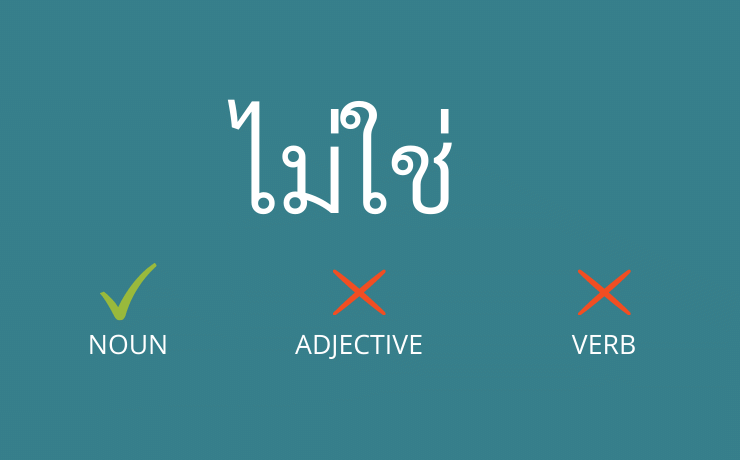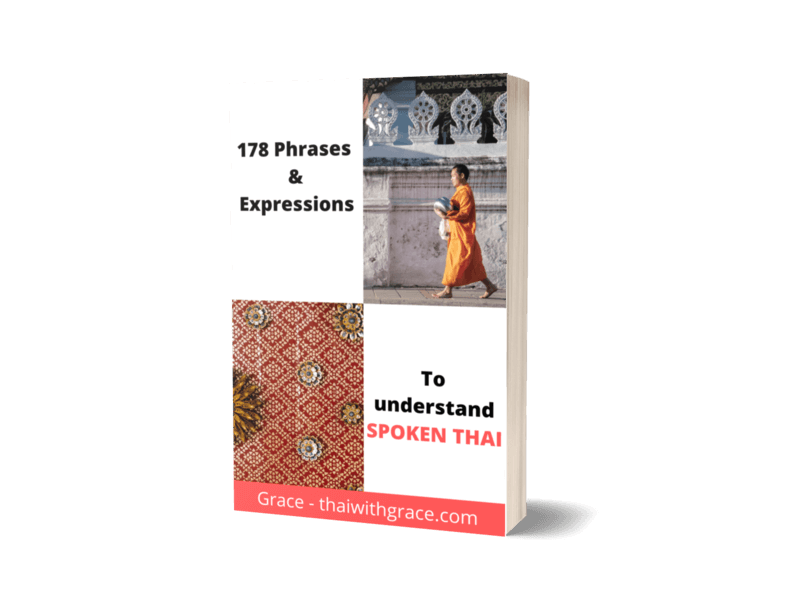The word ‘mai chai’ (ไม่ใช่) in English means ‘not’ (as in I’m not a doctor).
While “don’t” is translated to ไม่ mâi (as in I don’t like you).
That is partially correct but you will definitely face some problems with that concept.
This is one of the most common mistakes that every Thai learner has to face. In this article, I would like to clarify this mistake and help you speak Thai better.
[ไม่ใช่ can also be used to answer the question ใช่มั้ย châi mái (really?). Please take a look at my Yes & No in Thai article to find out more

ไม่ใช่ + Noun
ไม่ใช่ (mâi châi) itself means ‘not to be = Not am/is/are’. Therefore, mâi châi has to be followed by a noun. The opposite of ไม่ใช่ is เป็น (bpen).
Examples:
- I’m not a doctor
ฉันไม่ใช่หมอ
chăn mâi châi mŏr - I’m not Thai
ฉันไม่ใช่คนไทย
chăn mâi châi kon tai - I am a teacher you are not a teacher
ฉันเป็นครู เธอไม่ใช่ครู
chăn bpen kroo · ter mâi châi kroo
ไม่ + adjective
The common mistake is here with the adjective. In English, the verb “to be” is used with adjectives (same with nouns). I.e: I am sad, you are strong, he is good, etc.
In Thai, you would turn all these words into “I sad”, “you strong”, “he good” etc. (This is actually the way some Thai people use English because they have only learned words, not English grammar.)
Examples:
- ✅ I sad 🆇 I am sad
✅ ผมเสียใจ 🆇 ผมเป็นเสียใจ
✅ pŏm sĭa jai 🆇 pŏm bpen sĭa jai - ✅ you no strong 🆇 you are not strong
✅ คุณไม่แข็งแรง 🆇 คุณไม่ใช่แข็งแรง
✅ kun mâi kăeng raeng 🆇 kun mâi châi kăeng raeng - ✅ he no bad 🆇 he is not bad
✅ เขาไม่เลว 🆇 เขาไม่ใช่เลว
✅ kăo mâi leo 🆇 kăo mâi châi leo - ✅ Today no hot 🆇 today is not hot
✅ วันนี้ไม่ร้อน 🆇 วันนี้ไม่ใช่ร้อน
✅ wan née mâi rón 🆇 wan née mâi châi rón
ไม่ + verb
To negate an action (eat, walk, like, think, etc.) you can simply use the word ไม่ (mâi).
Examples:
- I don’t want it
ฉันไม่เอา
chăn mâi ao - I want like to eat pizza
ฉันไม่ชอบกินพิซซ่า
chăn mâi chôp gin pít-sâa - He doesn’t think it’s a good idea
เขาไม่คิดว่ามันเป็นไอเดียที่ดี
kăo mâi kít wâa man bpen ai dia-têe-dee - You don’t want to live with me
คุณไม่อยากอยู่กับฉันหรือ
kun mâi yàak yòo gàp chăn rĕu
You should now be able to use mai chai (ไม่ใช่) like a Thai and avoid the common mistakes.

